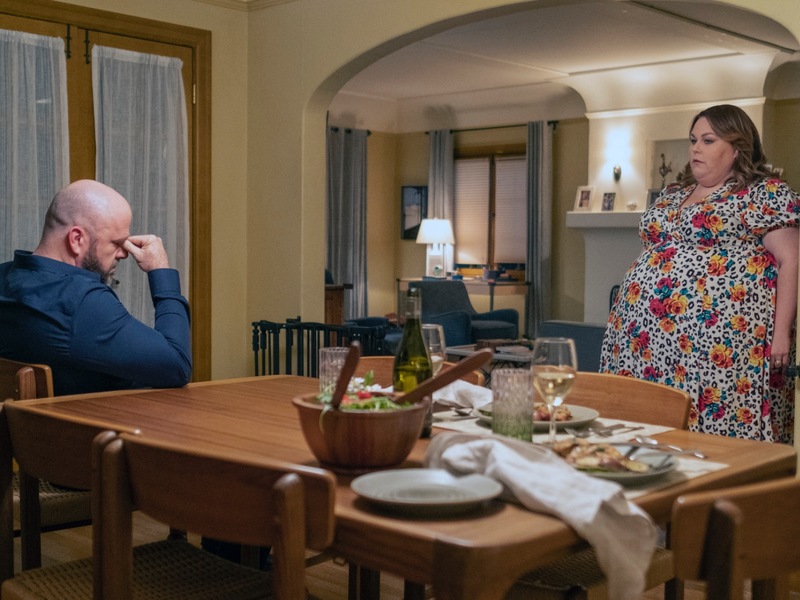Fifteen minutes into Tuesday night's episode, I finally got what I wanted from "This Is Us" – and it wasn't very good.
After complaining for the past several weeks about the show trying to cram every single storyline for every single character from every single timeline, NBC's hit show finally delivered a honed-in standalone episode focused on a single storyline, letting it breathe and develop. But "Vietnam" was always going to be a tricky hour for "This Is Us" to pull off, from the production values necessary to create an authentic glimpse of war (and the shots of Kevin's WWII movie were not reassuring) to avoiding the tropes and cliches of the genre that were already tired before the previous war was over.
And while regular "This Is Us" director Ken Olin does a fine job with the former, for the first third of the episode, the only surprises came when the soundtrack didn't play "Fortunate Son" or Buffalo Springfield.
But then something happened: The episode was a disappointment ... until it wasn't, eventually revealing through some clever script structure (because even a relatively stripped-down episode of "This Is Us" requires flashbacks on flashbacks) to be less about what happened to Jack in Vietnam and more about how we – Jack, his brother, everyone else – got there. The result went from a mild letdown to one of the most impactful episodes of the young season.
Let's quick get the mediocre part out of the way (though the plot points are so familiar, you could probably beat me to the end of each sentence). Jack and his squad are roaming through the Vietnamese jungle, with one character talking about how he only has 90 days left on his duty and how he can't wait to get home and play baseball. So of course he is doomed. At least he only loses his leg and future career on the diamond, though; the same can't be said for another member of Jack's crew who makes the grave war movie mistake of joking around, having fun and playing catch, stepping on a landmine and igniting a firefight.
Jack survives – spoiler alert – and earns some cushy duty protecting a small compound and batting away some of his fellow troops' cynical racism before he discovers where he could find his brother. Thus begins Saving Private Nicky – though, thanks to the show's quick opening flash-forward, it doesn't appear to be tough mission, finding him without a fight Article 15-ed lighting cans of crap on fire while on latrine duty.
Nothing so for in "Vietnam" was awful, but it sure felt underwhelming to travel to Vietnam, to a key part of Jack's foundation, and find only dusty cliches and exhausted, trite tropes – especially considering everyone involved. Not only has "This Is Us" earned its reputation as one of the better shows on television thanks to its avoidance of cliches, zigging when familiar stories zag and toying with your expectations, but this episode also recruited author Tim O'Brien of "The Things They Carried" fame to co-write the hour. A good bit into the show, though, you would've thought the episode came from a guy who half-watched "Platoon" and "Forrest Gump" in the background, not the man who wrote one of the most essential books on the subject.
But then O'Brien takes over the keyboard, and that lackluster first 15 minutes turns into the foundation for a beautifully told trail of guilt and the weight of war, duty and wounded masculinity – walked backwards. Nick says at one point, "You ever think your life would make sense if you looked at it in reverse" – and "This Is Us" proves his point. The episode keeps going further and further back in time, again not to find out what happened in Vietnam (after all, dramatically speaking, we know – nice to see the show learning a bit of its lesson from last year's Jack death debacle) but how we got to Jack, Nick and a smoking barrel of excrement.
One flashback takes the audience back to Jack pre-Vietnam, reading his brother resigned to his death, only finding hope in that he might just die on his own terms. Jack heads to the doctor to get the OK to enlist – even though he has an irregular heart beat, he also has a sense of duty and guilt to watch after his younger brother. The doctor gives him tips to get past the war doctors – though he notes, considering the state of things, they probably wouldn't turn away an actual volunteer.
Another hop back in time brings Nick home as well, the two brothers concerned about the upcoming televised war draft. Of course, despite all of Jack's optimism and pep talks, Nick's birthday – Oct. 18 – gets selected, sending him to Vietnam. Their drunk, abusive father tells the younger Pearson to make him proud, but Jack and his mother have other plans, packing him for a fishing trip to Canada. But while Jack tells him it's not your job to fight their father's demons, Nick clearly feels a sense of duty and a sense of guilt – the O'Brien influence making its presence felt in the script, men fracturing themselves in the names of what they believe they should do. "Men killed, and died, because they were embarrassed not to," O'Brien famously wrote in "The Things They Carried" – and that bleeds into the tragedy of the Pearson men at war.
The final flashback, taking place 14 years even further back at Nick's birth, hits the hardest, however, probably because it's the happiest, the most innocent, one that shows how far these people have broken – most notably Jack's father, who's jovial and, the biggest shock, sober. His father, however, is a distant, cold drunk who one can feel his influence weighing – and eventually altering – his son. Meanwhile, in the hospital room, Nick is born without a problem – mere minutes away from being born on Oct. 19 instead, unbeknownst to everyone sealing his fate years in the future.
But the real emotional dagger comes in its final moments, as Jack's father takes him to see his new brother in the maternity ward, preaching that "big brothers look after little brothers." He then notes that all these little boys have the same birthday – and the blood runs cold. It's a room full of new life, all doomed to be sent to their death. You're looking a military unit, not newborns – all to be crushed by a sense of duty inflicted upon them by either their country, their family (in Jack's case) or themselves.
It's the emotional gut punch the show hasn't had so far this season – and that I certainly didn't expect considering the way the episode began. But "This Is Us" now has its first great moment, combining what the show does so well – looking at how our pasts define or ripple through our futures – with what O'Brien does so well, explaining the unexplainable, inescapable weight of war.
So I guess, in the end, the season's first solo episode did give me exactly what I wanted.
As much as it is a gigantic cliché to say that one has always had a passion for film, Matt Mueller has always had a passion for film. Whether it was bringing in the latest movie reviews for his first grade show-and-tell or writing film reviews for the St. Norbert College Times as a high school student, Matt is way too obsessed with movies for his own good.
When he's not writing about the latest blockbuster or talking much too glowingly about "Piranha 3D," Matt can probably be found watching literally any sport (minus cricket) or working at - get this - a local movie theater. Or watching a movie. Yeah, he's probably watching a movie.



.jpg)



